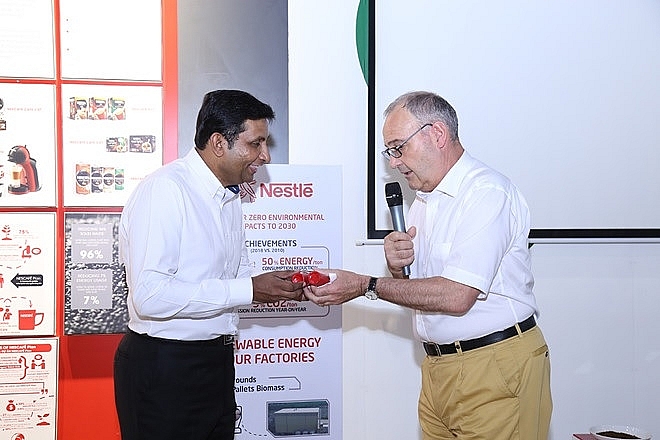Nestlé Vietnam embodies Swiss core business values
 |
| Swiss Federal Councillor Guy Parmelin (right) lauded Nestlé Vietnam’s growth |
On July 12, Guy Parmelin visited Nestlé Vietnam’s Tri An factory in the southern province of Dong Nai as part of his official visit to Vietnam to help Swiss enterprises connect with local counterparts and simultaneously discuss the opportunities arising from the EU-Vietnam Free Trade Agreement (EVFTA) for Switzerland and Vietnam.
“The Nestlé brand is intrinsically linked to some of Switzerland’s core values,” said Ganesan Ampalavanar, managing director of Nestlé Vietnam. “Among these is an uncompromising commitment to the highest possible quality standards, great efforts for continuous improvement, and the incorporation of the latest technologies, with the purpose of ensuring mutual long-term success through contributing to society. We call this Creating Shared Value.”
Switzerland has been Vietnam’s economic development partner for over 25 years and Nestlé has been actively working to contribute to this co-operation through the promotion of sustainable economic growth. Nestlé’s initiatives such as the Nescafé Plan and other Creating Shared Value initiatives are good examples of bringing the Swiss government’s vision to life. Parmelin was impressed by what Nestlé Vietnam has achieved and he wished the company continued success in its further growth and development.
During the July 10-14 visit to Vietnam, Parmelin attended talks with the Vietnamese government on free trade agreements. He also visited a number of economic development co-operation projects. He was accompanied by representatives of Switzerland’s business community as well as representatives from the fields of education, research, and innovation.
Incorporated in Vietnam in 1995, Nestlé Vietnam has invested around $600 million and generated employment for 2,300 people. The company’s leading brands include Milo, NAN, Nescafé, Maggi, and KitKat. Nestlé Vietnam operates four factories and two distribution centres, and continues to expand steadily. Vietnam is the second-biggest coffee producer in the world and the biggest in Robusta, while Nestlé is the biggest buyer of coffee in Vietnam (approximately 20 per cent of the total output). Each year, the company injects over $600 million into the rural economy through coffee purchases.
Since its inception in 2011, the Nescafé Plan has been hailed as one the most successful partnerships of a commercial business with agriculture and farmers by the Vietnam’s Ministry of Agriculture and Rural Development (MARD). Over nearly nine years, Nestlé Vietnam has distributed around 36 million high-yielding plantlets and ogranised training for 230,000 farmers. This has helped farmers reduce up to 40 per cent of water usage and apply 20 per cent less pesticide, agrochemicals, and fertiliser. As a result, the Nescafé Plan has helped to increase farmers’ income by 30 per cent and has improved resilience through sustainable and better farming practices.
Along with the focus on the quality of the products as well as contribution to Vietnam’s economic growth, the group also pays attention to the environment via setting out the ambitious goal of recycling and reusing 100 per cent of its product packaging by 2025. Besides, on the global level, Nestlé applies a life cycle approach to environmental sustainability and adopts a Water and Environmental Sustainability Policy. Thanks to these global initiatives, Nestlé, with its well-known brands like Nescafé, Maggi, and Milo is consistently ranked among the top ten most sustainable businesses in Vietnam.
The group strives to become an international corporation that is not only deeply integrated into the local community, but also accompanies that community on its path towards long-term growth and prosperity.
Thanks to these efforts, Nestlé Vietnam has been acknowledged by the Vietnamese government for its contribution to the nation’s socio-economic development with various recognitions from the Ministry of Finance, the Ministry of Planning and Investment, the MARD, the Ministry of Labour, Invalids and Social Affairs, as well as the Vietnam Chamber of Commerce and Industry.
What the stars mean:
★ Poor ★ ★ Promising ★★★ Good ★★★★ Very good ★★★★★ Exceptional
Related Contents
Latest News
More News
- Vietnam sets ambitious dairy growth targets (February 24, 2026 | 18:00)
- Masan Consumer names new deputy CEO to drive foods and beverages growth (February 23, 2026 | 20:52)
- Myriad risks ahead, but ones Vietnam can confront (February 20, 2026 | 15:02)
- Vietnam making the leap into AI and semiconductors (February 20, 2026 | 09:37)
- Funding must be activated for semiconductor success (February 20, 2026 | 09:20)
- Resilience as new benchmark for smarter infrastructure (February 19, 2026 | 20:35)
- A golden time to shine within ASEAN (February 19, 2026 | 20:22)
- Vietnam’s pivotal year for advancing sustainability (February 19, 2026 | 08:44)
- Strengthening the core role of industry and trade (February 19, 2026 | 08:35)
- Future orientations for healthcare improvements (February 19, 2026 | 08:29)

 Tag:
Tag:



















 Mobile Version
Mobile Version